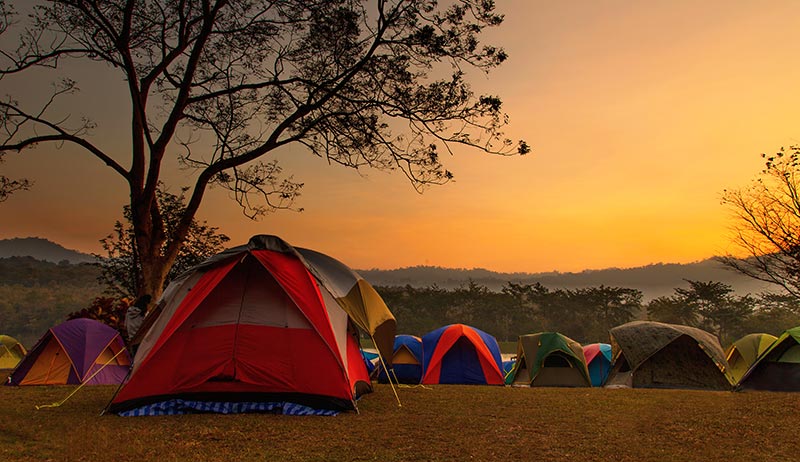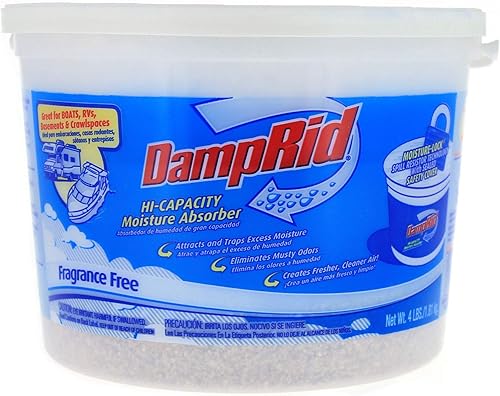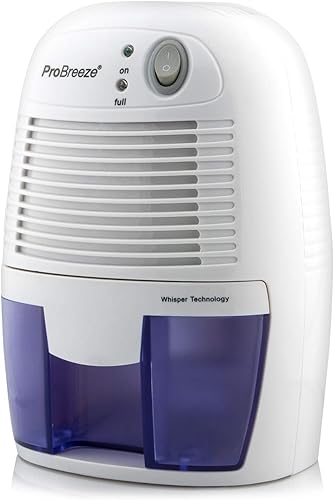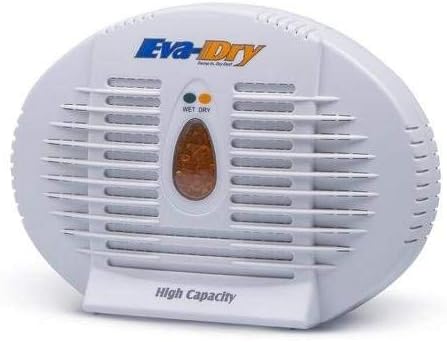Tent camping is a popular past time and is enjoyed by people of all ages.
It can be a relaxing and enjoyable opportunity to get out and enjoy nature, spend time with friends and family, and have a grand adventure away from the real world.
Sleeping under the stars, watching the wild and untamed life all around, cooking over a campfire, unplugging and escaping the stress of the world, and hiking through the woods are best done with a comfortable tent to sleep in at night.
Dealing with moisture in the tent, dripping down on you as you sleep, and getting your gear and equipment wet can really put a damper on the camping experience.
What causes the water condensation in the first place and what can be done to keep it from happening?
Humidity and Condensation in Tents

The annoying dripping inside your tent starts with humidity. High humidity levels basically mean there’s a lot of water in the air.
Water turns into gas vapors when it is warm but as the air cools it condenses and the droplets start to stick together.
This is exactly how clouds form up in the sky. As the vapor condenses, the droplets get bigger and start to gather on surfaces where the warm and cooler air meet.
That’s why there’s dew on the ground in the morning.
In your tent, the walls and ceiling get cold to the touch because the air outside is colder. When warm air inside the tent contacts the cold tent walls, it forms water droplets, which is called condensation.
The more moisture there is in the tent and the greater the temperature difference between inside and outside air temperatures the more condensation you will likely have.
While is it not possible to completely eliminate moisture from the air, there are ways to minimize it and to reduce the chances of condensation and to keep it to a minimum if it does happen.
How To Stop Condensation In Your Tent
While you are preparing for your next camping adventure, there are a few things you can do to help reduce condensation and to keep this issue from ruining your good time:
Maintain Airflow Inside the Tent
Our bodies are made of water and as we breathe, we exhale small amounts of water vapor that get released into the air.
During the night, one or two people in a tent can produce several liters worth of moisture, and it can quickly accumulate in the tent!
This is one of the main causes of condensation inside a tent.
Keeping airflow high the single best way to prevent moisture from building up inside the tent and to keep everyone safe and comfortable inside during the night.
In warm weather keep the screen flaps open and as soon as you wake up, unzip the tent and let it air out for a few hours.
Balancing the temperatures between inside and outside can also help reduce condensation. In cold weather, there’s a lot more difference in temperature between the inside and outside of the tent.
The tent needs to be left open and airing out as much as possible because it is better to bundle up to stay warm than to try and trap all the heat inside the tent.
Don’t Store Wet Clothes and Gear in the Tent
The best way to avoid excess moisture in your tent is to not let it get in there in the first place. Bringing in wet clothes and gear into the tent is asking for trouble.
The best way to do is to keep clothing and gear dry a much as possible and have someplace other than your tent to keep your wet gear in to dry out.
Two words come to mind for dampness prevention when it comes to supplies and clothing: plastic bags.
Plastic bags and containers are your best friend when camping for this!
Trash can liners are great for storage and can keep your gear dry while it is being stored and then they can also be used to keep wet items sealed away.
Smaller zip lock bags and similar sealing bags are also great for keeping clothes dry and protected.
Separate your clothing into large plastic zipper bags that can then be stored into duffle bags, cargo boxes, or other places quite easily.
These simple tools are perfect for keeping your items dry and protected against moisture.
Use a Dehumidifier
When moisture gets to the point you just can’t keep it out of your tent and are starting to see condensation, the best thing you can do it use a dehumidifier of some kind to absorb that moisture out of the air.
There are two types of dehumidifiers to use inside a tent: chemical and rechargeable.
The chemical type is designed as hanging bags and tubs that use non-toxic calcium chloride salts to pull the moisture out of the air. These disposable dehumidifiers are easy to use and throw out when needed.
While they are convenient, a disposable dehumidifier can only do so much and are limited to how much moisture they can remove.
A more effective way to prevent condensation inside the tent is the use of an electrical rechargeable portable dehumidifier.
These devices are easy to set up and can be placed in out of the way areas of the tent to keep things drier.
The battery-powered dehumidifiers will work for the entire camping trip on one charge and can easily be switched on and off as needed.
How To Choose The Right Tent Dehumidifier
When you are shopping around for your next camping trip, you may want to consider a dehumidifier of some kind.
There are four things you need to consider when trying to choose the tent dehumidifier that is best suited for your unique wants and needs:
- Portability- when you are camping you want to be able to pack up and move and reorder something as you need so portability is a big factor to consider.
- Usability- between chemical-based and electrical based dehumidifiers it is important to choose something you can easily set up and use during your trip.
- Convenience- for a quick and easy set up the disposable option is an obvious choice but for repeat trips, the electrical dehumidifiers can be the most convenient option.
- Price- for the occasional camping trip a disposable option can be a good choice but an avid camper will be well served by investing in a durable dehumidifier.
Top Three Choices For Tent Dehumidifiers
When the time comes to choose a tent dehumidifier for your upcoming camping trip these three options are great products to have on hand in your ten while you are camping:
1. DampRid Fragrance Free Moisture Absorber
- Super absorbent dehumidifier bucket is designed to attract and trap excess moisture, and also fight mold, mildew, and musty odors.
- Ideal for larger spaces these buckets help clean and deodorize stagnant air and helps to keep excess moisture from becoming a problem.
- The 4 lb. bucket gives you maximum usability and can last up to 6 months, depending on temperature and humidity levels.
- Once the moisture-absorbing crystals have been used up the entire tub can be easily sealed and disposed of for easy replacement.
2. Pro Breeze Electric Mini Dehumidifier
- This compact and highly portable dehumidifier can easily pullout up to 9 ounces of water per day with a 16-ounce water tank capacity.
- When full, the dehumidifier will automatically shut off and an indicator light lets you know it needs to be emptied so it can be used again.
- The advanced design of this dehumidifier runs soft and quiet, making it great for sleeping areas and use around kids and animals too.
- With a durable overall design, this system is easy to set up and use just about anywhere thanks to its versatile features and components.
3. Eva-dry E-500 Renewable Mini Dehumidifier
- Environmentally friendly design is perfect for nature lovers who want to reduce their impact and protect the environment with reusable products.
- This dehumidifier removes messy dumping, spills, and inconvenience and makes it easy to keep any space dry and fresh day after day.
- Designed to be durable and sued regularly at home or on the go, this dehumidifier is designed with a10 year life span.
- The advanced design and safety features of this unit make it great for use by people of all ages and is designed to run quietly and effectively.
Dealing with moisture in the tent, dripping down on you as you sleep, and getting your gear and equipment wet can really put a damper on the camping experience.
But as we have seen there are options available to choose from, each one great for tent camping.
So, make your plans and be sure to pack a tent dehumidifier of some kind so you will be ready to tackle moisture and condensation problems should they start to arise!



